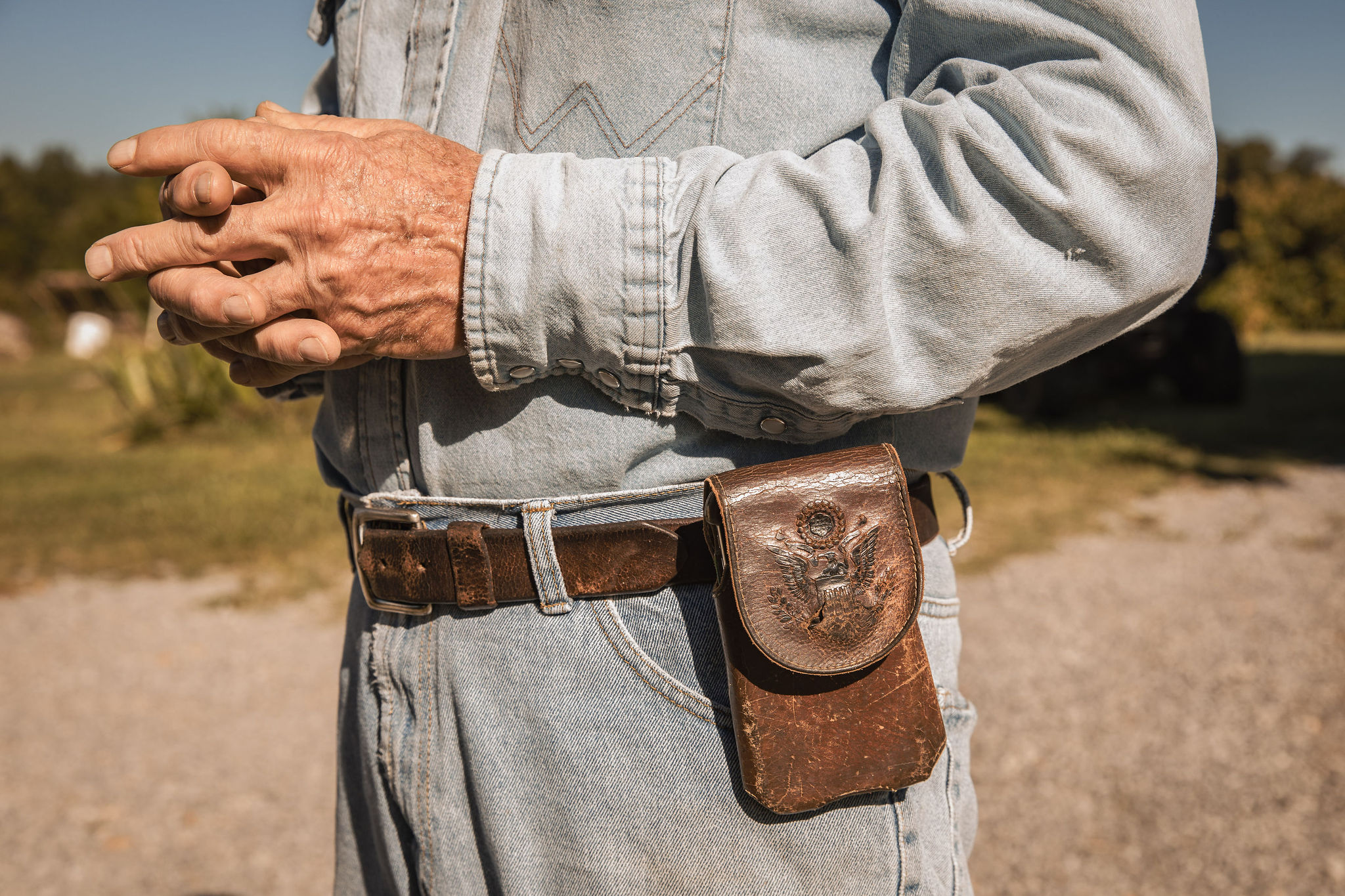
Let Them Eat Grass: the Life of Dave Waters
"Let us now praise famous men."
Food as a verb thanks
for sponsoring this series

"Where do you want to begin?" Dave Waters asks, standing under a bluebird August sky with 300 acres of Meigs County farmland behind him.
The green rolling land looks like a psalm. Behind him in the distance: the house he grew up in, the same house his mother was born and died in.
Also behind him? Decades of wisdom and experience.
In the ledger books recorded about regional agriculture, Dave Waters exists as an icon, a man well-versed in reinvention, transformation and resilience.
"Let us now praise famous men," the Hebrew canon declares.
In a time of increasingly technology, environmental stress and societal noise, can we listen to what men like Dave have to say?
His life, a lesson.
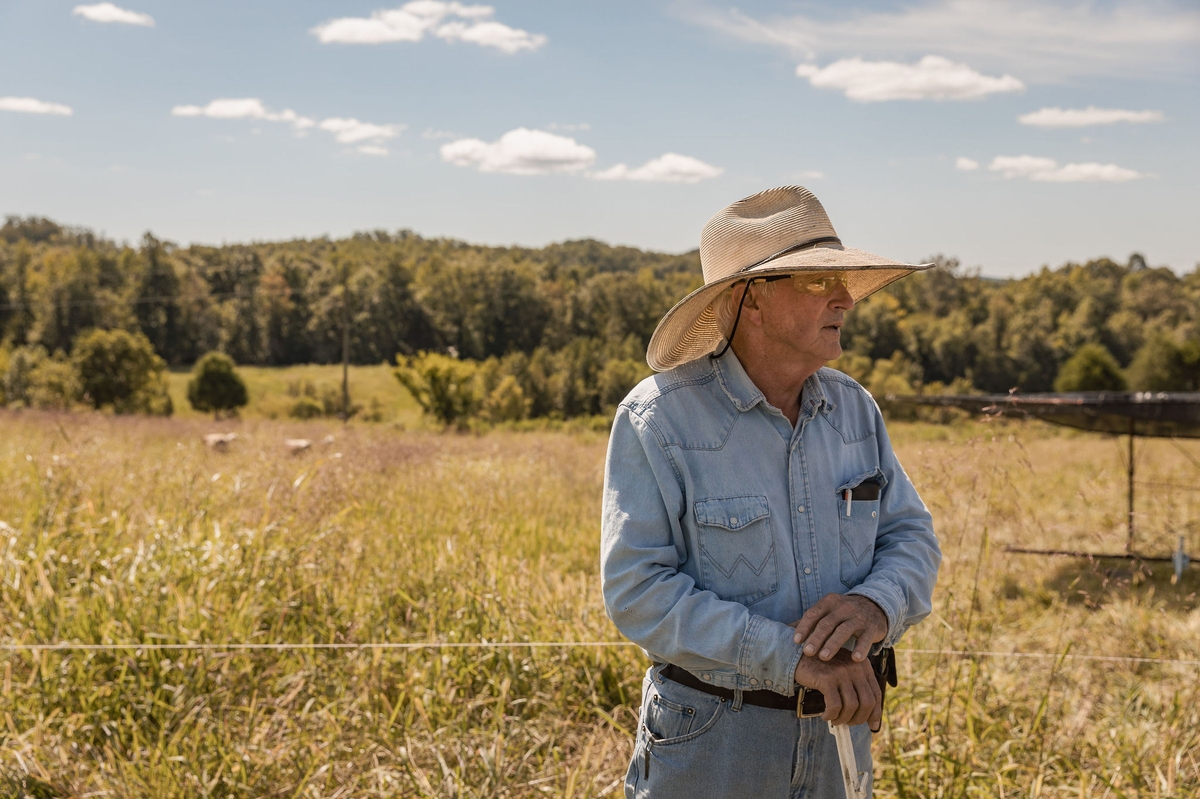
Dave and Verlinda Waters are early adopters of regenerative ag practices, eschewing conventional chemicals for fewer inputs. Helped start Chattanooga's first farmer-centric market. Placed their River Ridge Farm under a conservation easement with the Land Trust for Tennessee. When his father died of prostate cancer, so, too, did the use of chemicals on the land.
The river cane returned.
The birds returned.
The Waters returned.
"Getting rid of Roundup did a lot for the environment," he said.
The career Army officer and defense contractor was in the Pentagon on 9/11. At mid-life, he left Washington to return to Meigs County.
Six-and-a-half days a week, for since-always, Dave has done one thing: work and work hard.
"Three guys couldn't do what I do," he said. "I've got a mission? I'm going to do it."
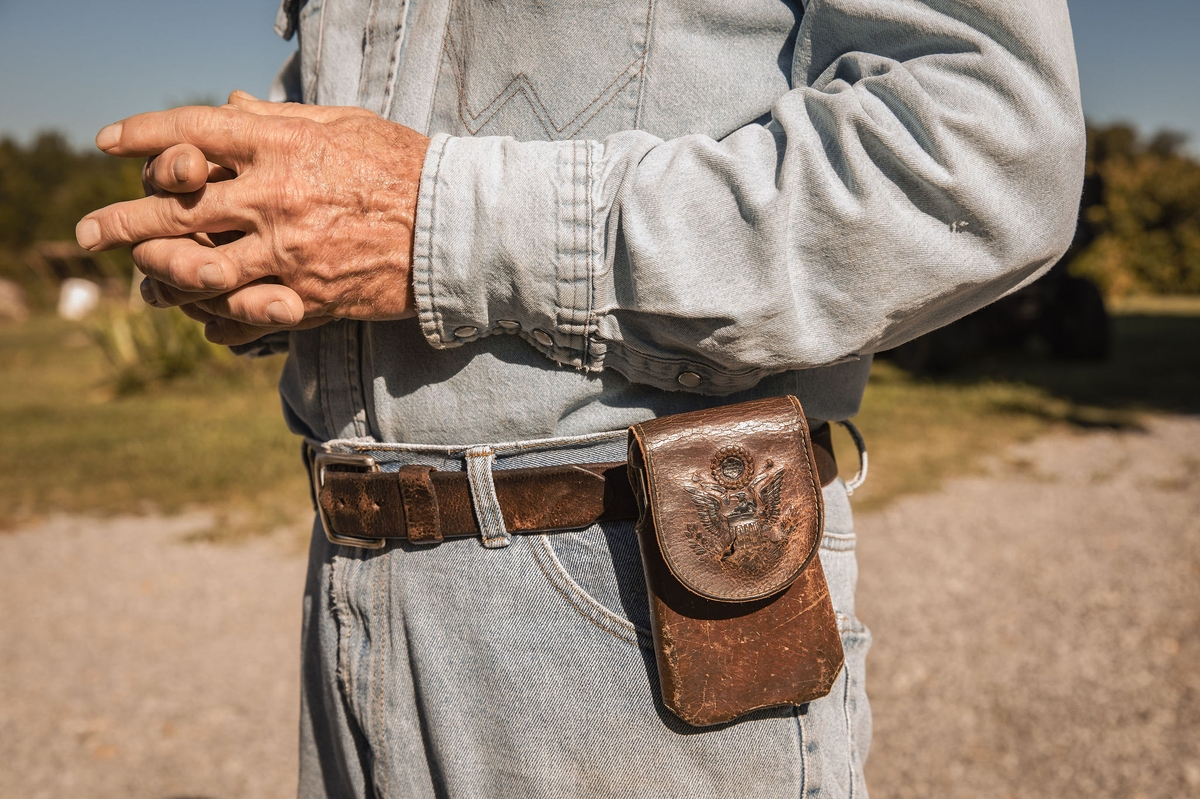
But now?
"I turned 73 last week," he said. "Age is catching up to me."
So when he asks — where do you want to begin? — there's really only one answer.
Wherever you want, Mr. Waters.
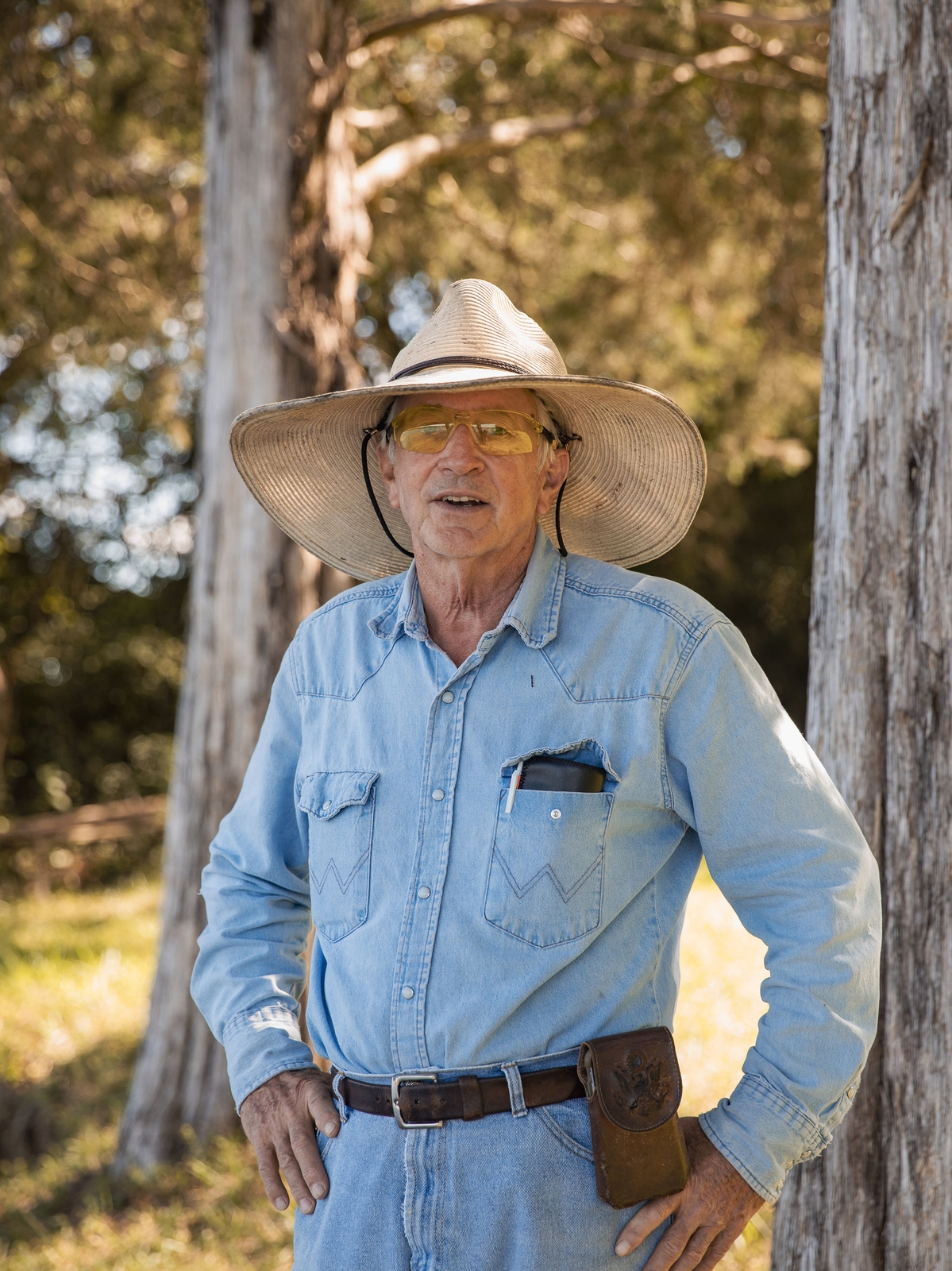
He unfurls a topo map of the land across the hood of his Kubota.
"My great-grandfather purchased that land in 1873," he said.
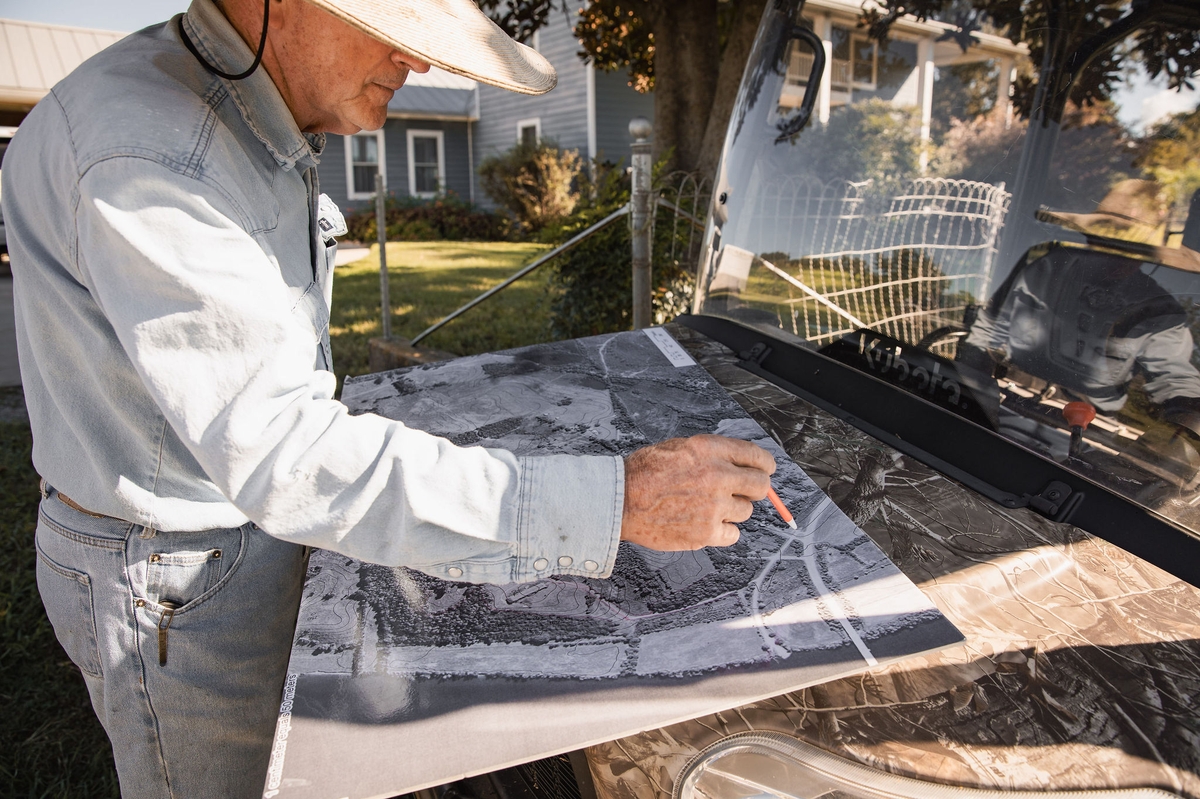
"My dad passed in '93 and my mother gifted land to my older sister. Verlinda and I got 150 acres along the river," he said.
He continues, his story also unfurling like that map.
"Verlinda had colon cancer in 1998. We got a wake-up call on what we were eating and our health," he said.
Soon, they returned to Meigs County and began farming.
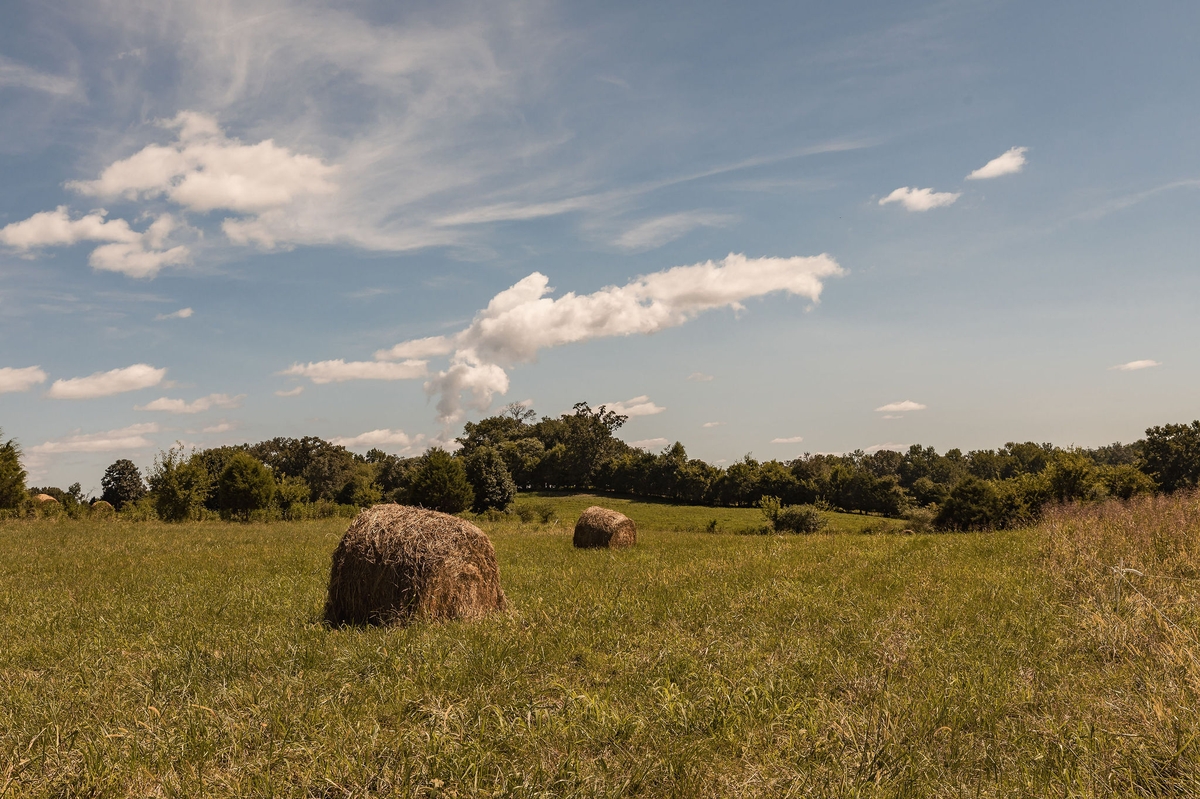
"My history? I graduated in 1970 from high school then went to Cleveland State.
"This was during Vietnam. My lottery number was 32. They wouldn't give me a student deferment. I went to UT and joined the Army ROTC and in December 1974, I went active duty.
"Verlinda and I married in 1972. For two redneck Tennessee hillbillies to move to Fort Ord — Monterrey Bay, California — was quite a culture shock," he said.
"I retired after 21 years and spent six more years in the Pentagon as a contractor."
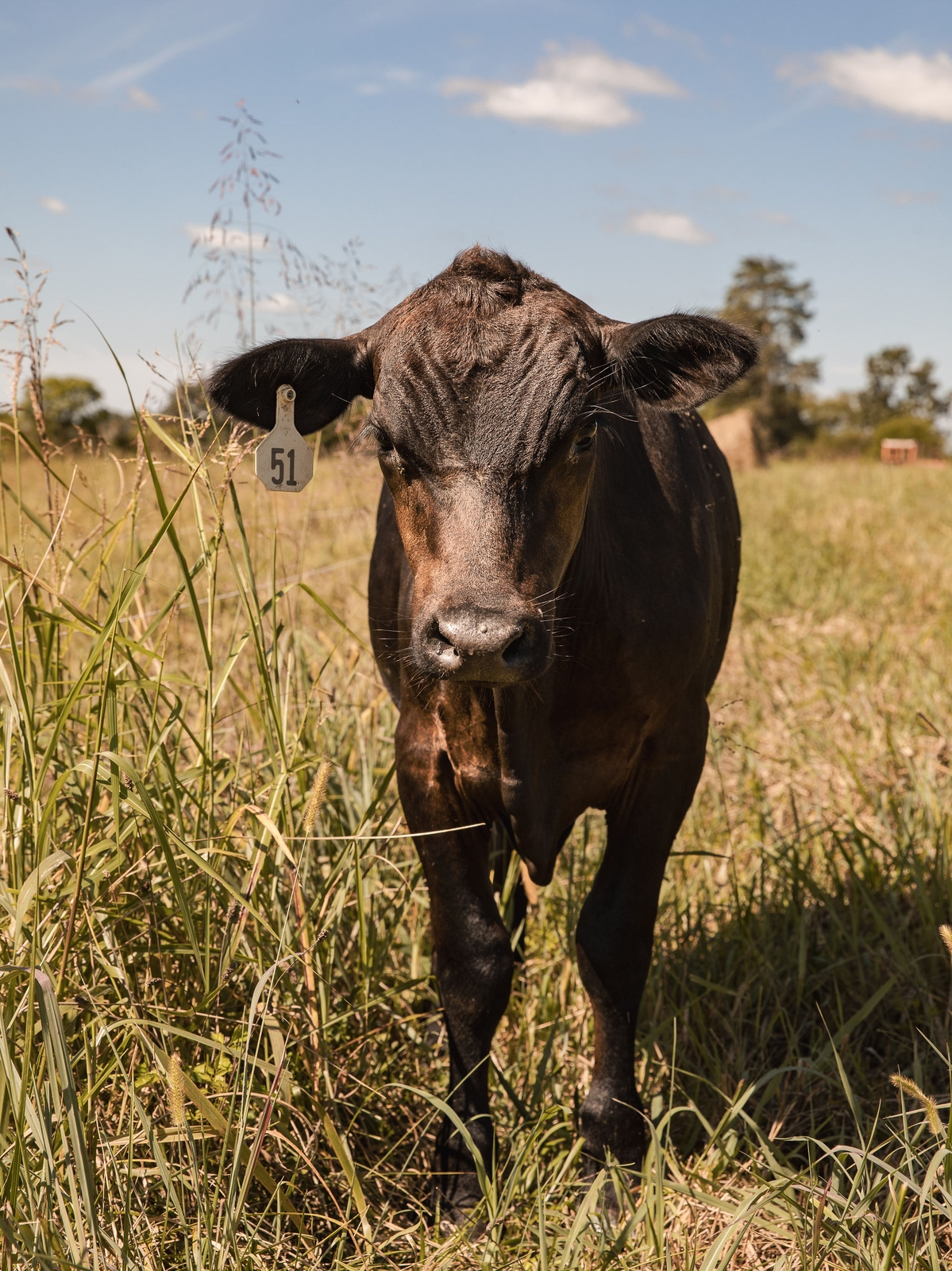
On September 11, 2001, he was at his desk with the plane hit the Pentagon.
Within a year, he'd left the Pentagon, returned to Meigs County and began farming full-time.
"I was 50," he said, "a midlife crisis."
"I like hard work. My dad always said: 'you can't make enough farming so you have to have a second job,'" he said.
"He was right."
Dave stopped here, pausing, as if his prologue was over. There were cattle, river cane and farmland to see.
We climbed in the Kubota. Driving through his farm, Dave had his eyes on the past, present and future.
Looking ahead.
Looking behind.
There is the ground beneath all the stories.
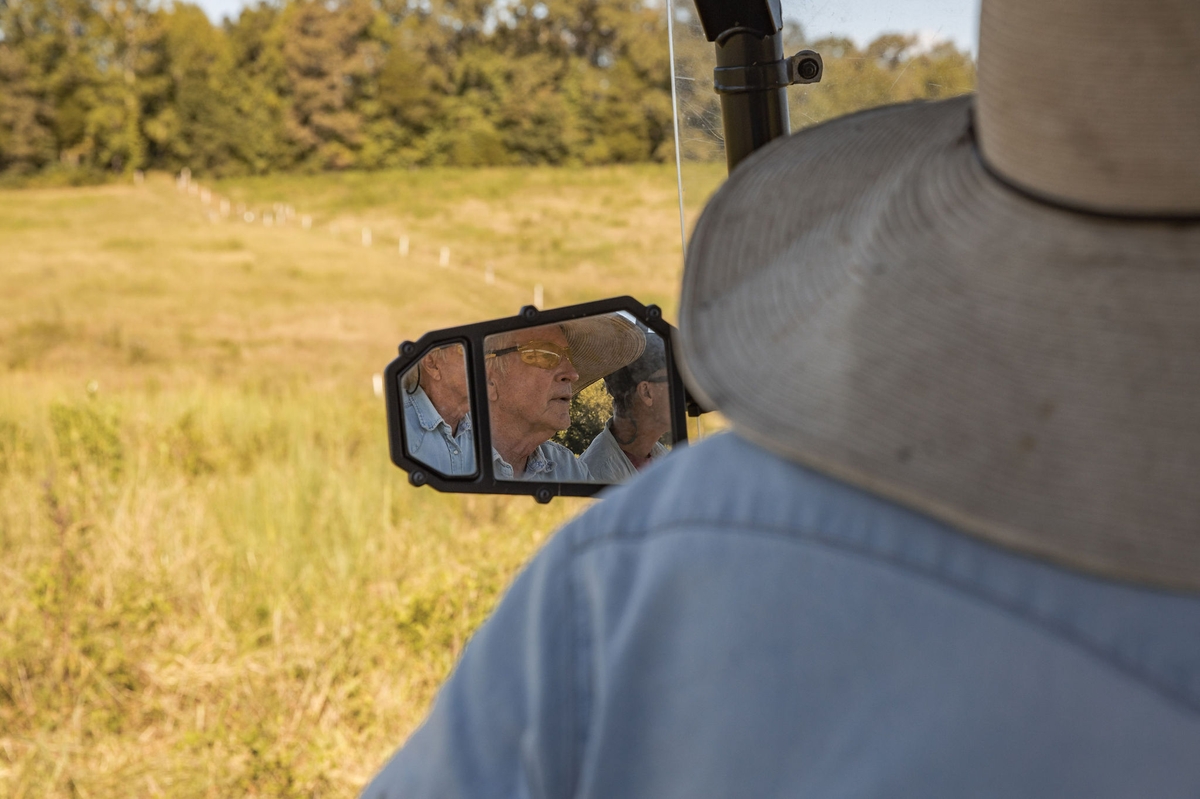
Currently, Dave farms some 50 head of cattle, managing a herd of South Poll, Red Angus, British Whites, Angus. He's using a Red Angus-Mashona cross bull and breeding for heat tolerance and fly resistance.
"When we acquired the additional 150 acres, some of the fields were covered with blackberries as tall as your head," he said.
So, they got goats. At the height of their market days, they were producing grass-fed beef, pork, eggs, a milk-share and broilers. Dave drove to Bowling Green for processing.
Today, though, its solely cattle. Dave weaned a calf the week prior; we find them under a late morning shade tree, the calf separated from its mama by a few strands of wire.
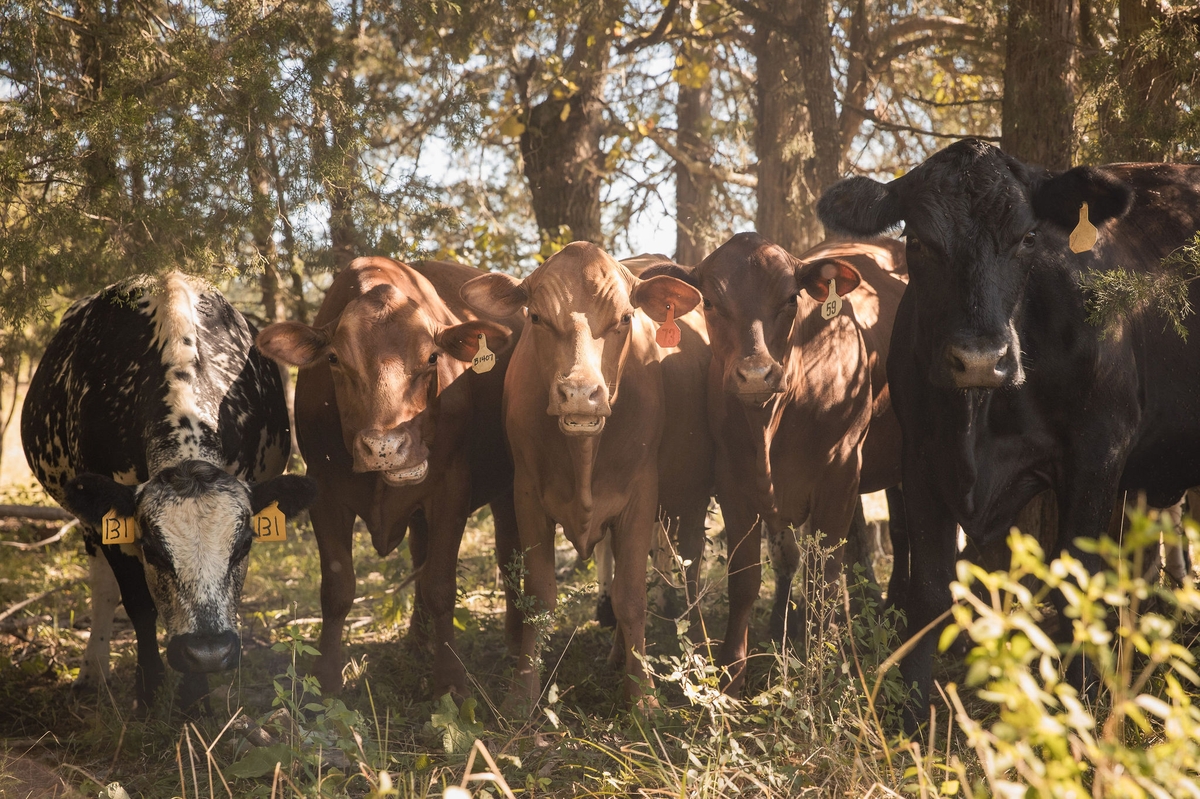
Dave begins to talk about the economics of farming.
"The farm bureau, farm co-ops, livestock pharmaceuticals. That's where the profit is in agriculture," he said. "Input costs have skyrocketed, but commodity prices have not kept up. They've stayed the same.
"We rely too much on conventional chemicals and fertilizers and, now, technology," he said.
While still at the Pentagon, he began subscribing to the Stockman Grass Farmer. Attended a Virginia Tech workshop with Joel Salatin and Alan Nation, then visited Polyface Farms, where Salatin holds workshops.
He left with a notion: I need to do more of that.
"Current conventional thinking is turning towards technology as the way to improve profitability," he said. "Technology can help. There are times we need herbicides and fertilizers, but we do not need use it as much as we do."
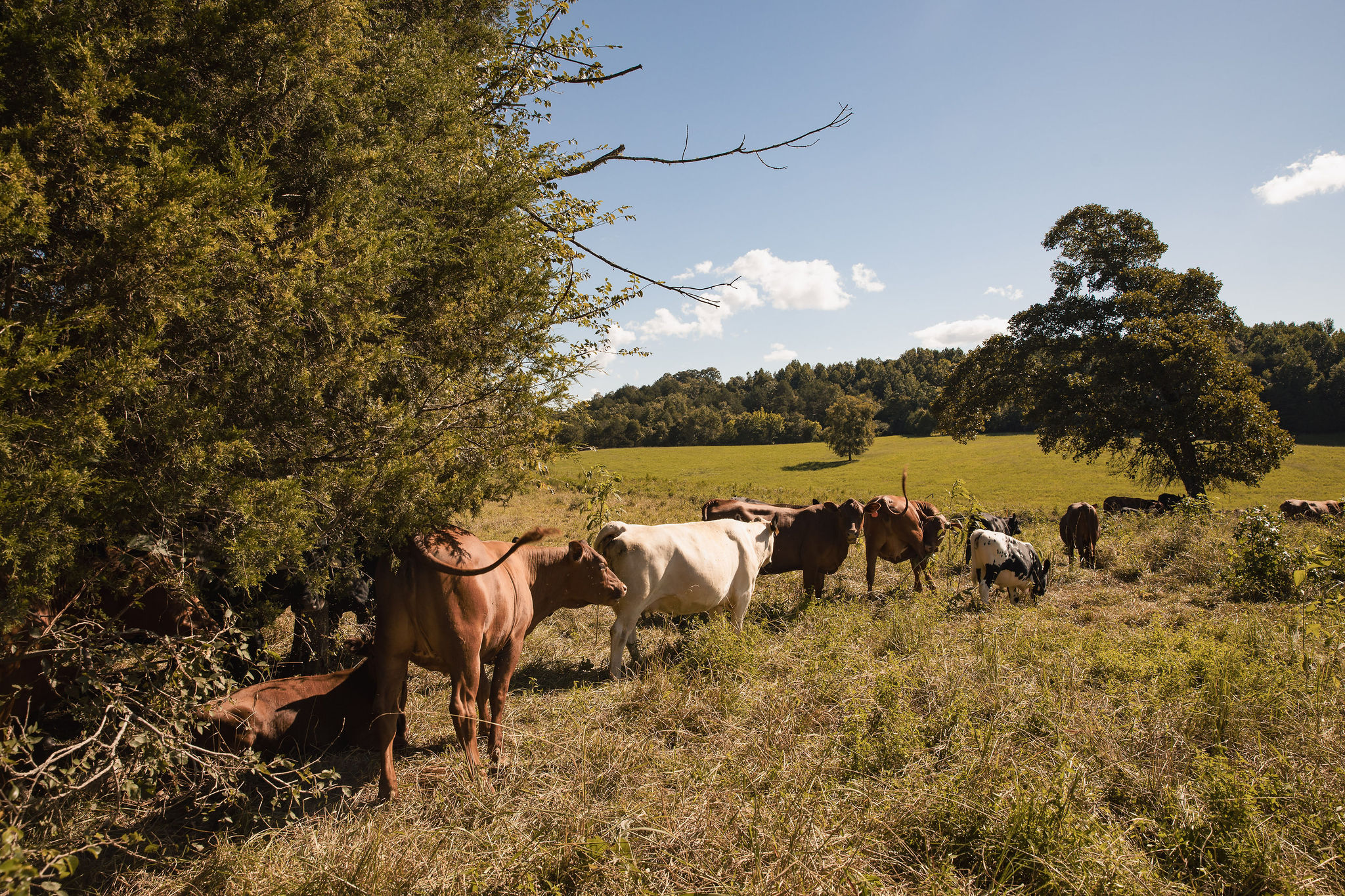
Today, River Ridge Farm rotates its herds daily and sells halves and whole shares to clients in Chattanooga, Tellico Plains, Knoxville and Meigs County. Gone are his market days.
He talked about the head-shakingly high prices in the cattle world:
Some $3000 for a cow-calf pair. In Oklahoma, three weeks ago, a young Angus heifer with her first calf brought $3900 at the stockyard, he mentioned. A neighbor sold an 800-pound calf at a feeder sale and got $3.50 per pound.
So, what do you love about cattle farming?
"It's good eating and a wonderful tool to help bring your soil back to life," he said.
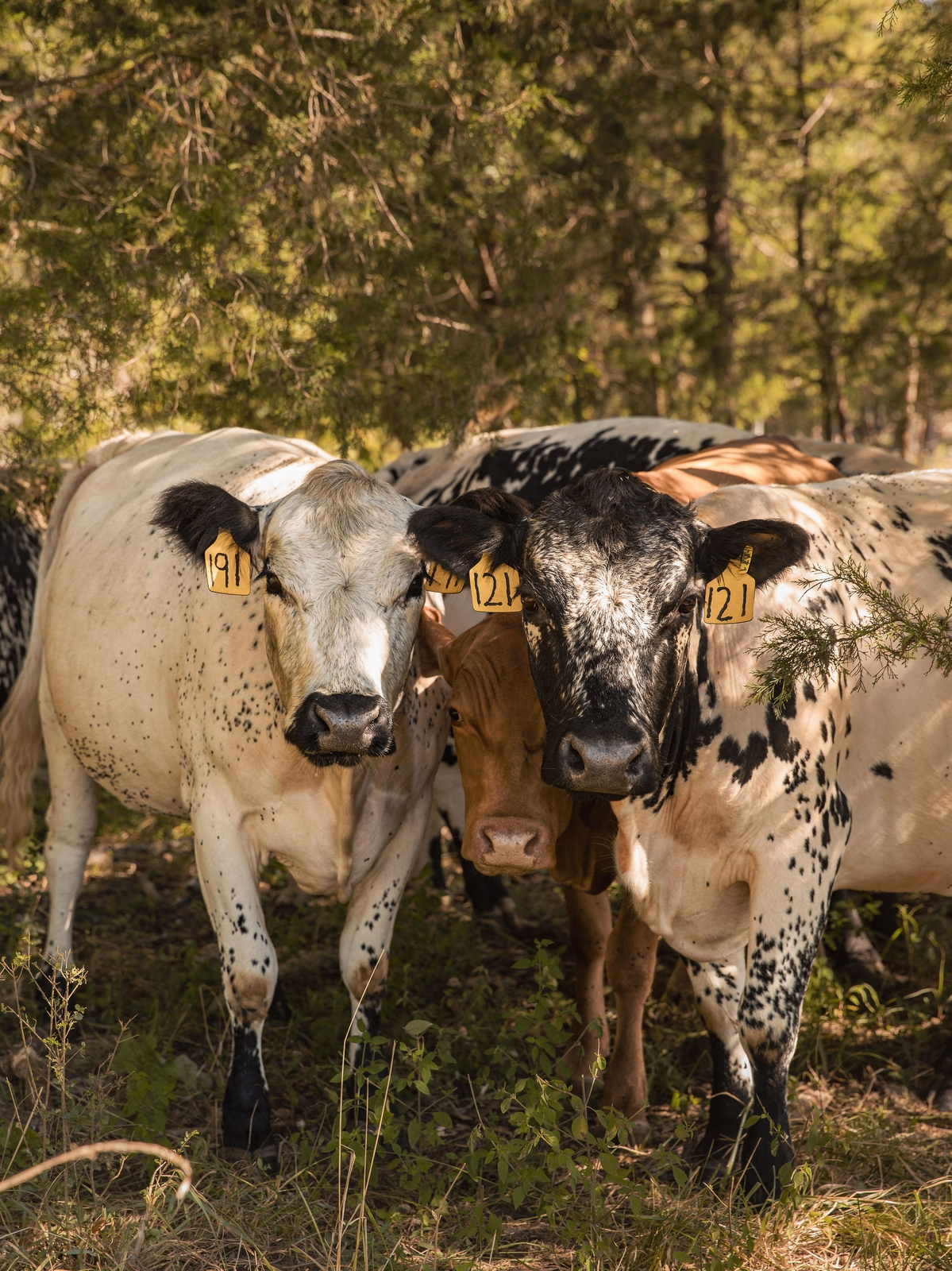
On September 11, 2001, he was at his desk in the Pentagon, working on force reduction analysis.
A colleague asked: did you hear about the Twin Towers?
"I assumed he was talking about a little Cessna," Dave said. "I had no idea until I felt the building shake."
Dust and waves of heat and debris. Fire alarms blaring.
"I locked the safe," he said. "And started evacuating."
The plane hit the area where, several weeks ago, Dave and his colleagues had been stationed. They'd moved from the area for renovation.
"I was already dreaming and planning. It was time to make the move. That was the last straw," he said.
By the fall of 2002, he and Verlinda had returned to Meigs County and began to farm full-time.
"I've started over many times," he said.
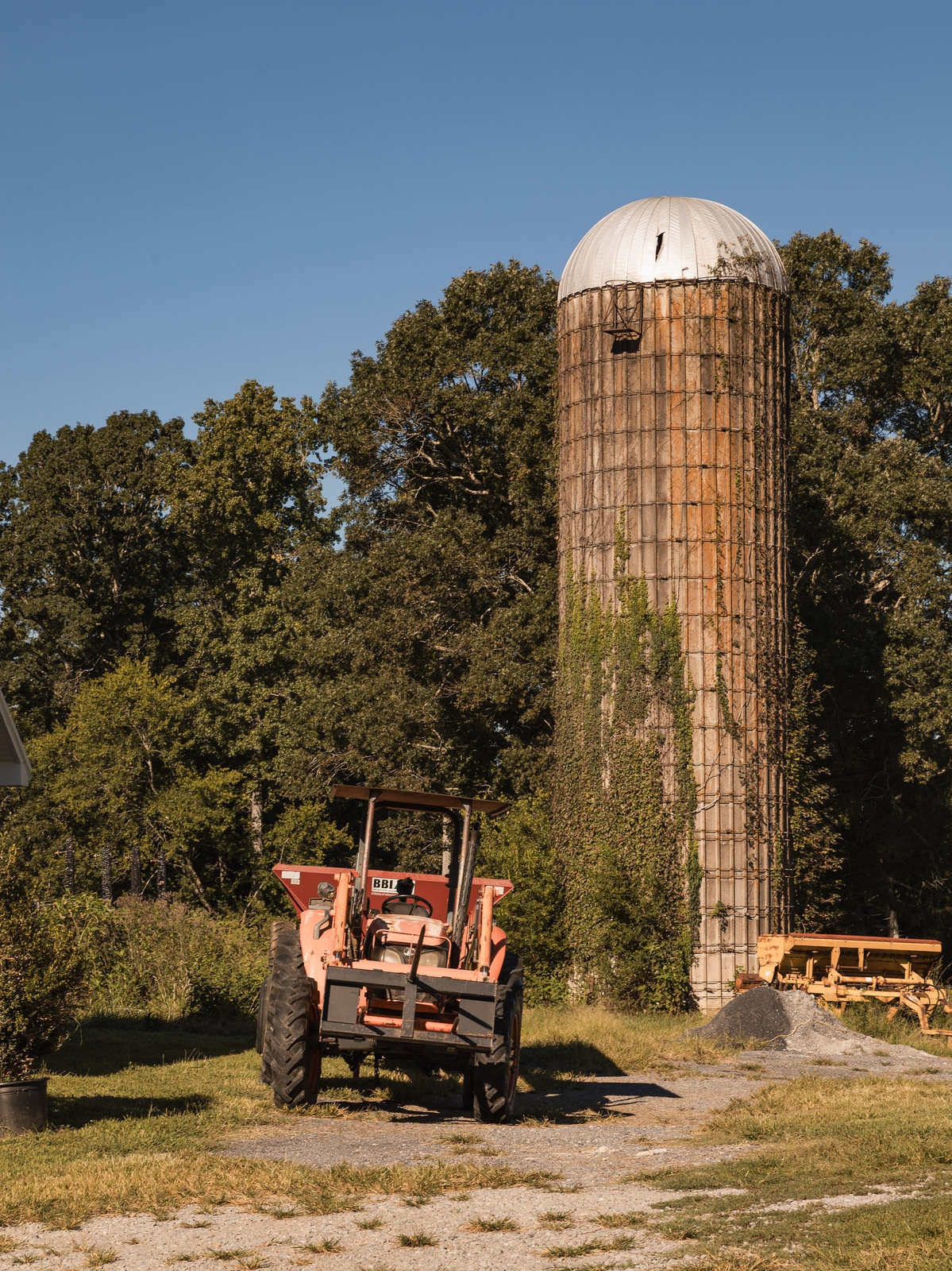
In 1998, Verlinda was diagnosed with colon cancer. (Today, she's cancer-free.) They learned to take more seriously their food — clean and whole versus processed — and the ground and practices from which it comes.
"What we ate was important," he said.
Sometimes, Dave Waters is a man of few words.
And often, Dave's few words are the only ones needed.
"We wanted to get the land in better shape," he said. "We need to take care of God's creation."
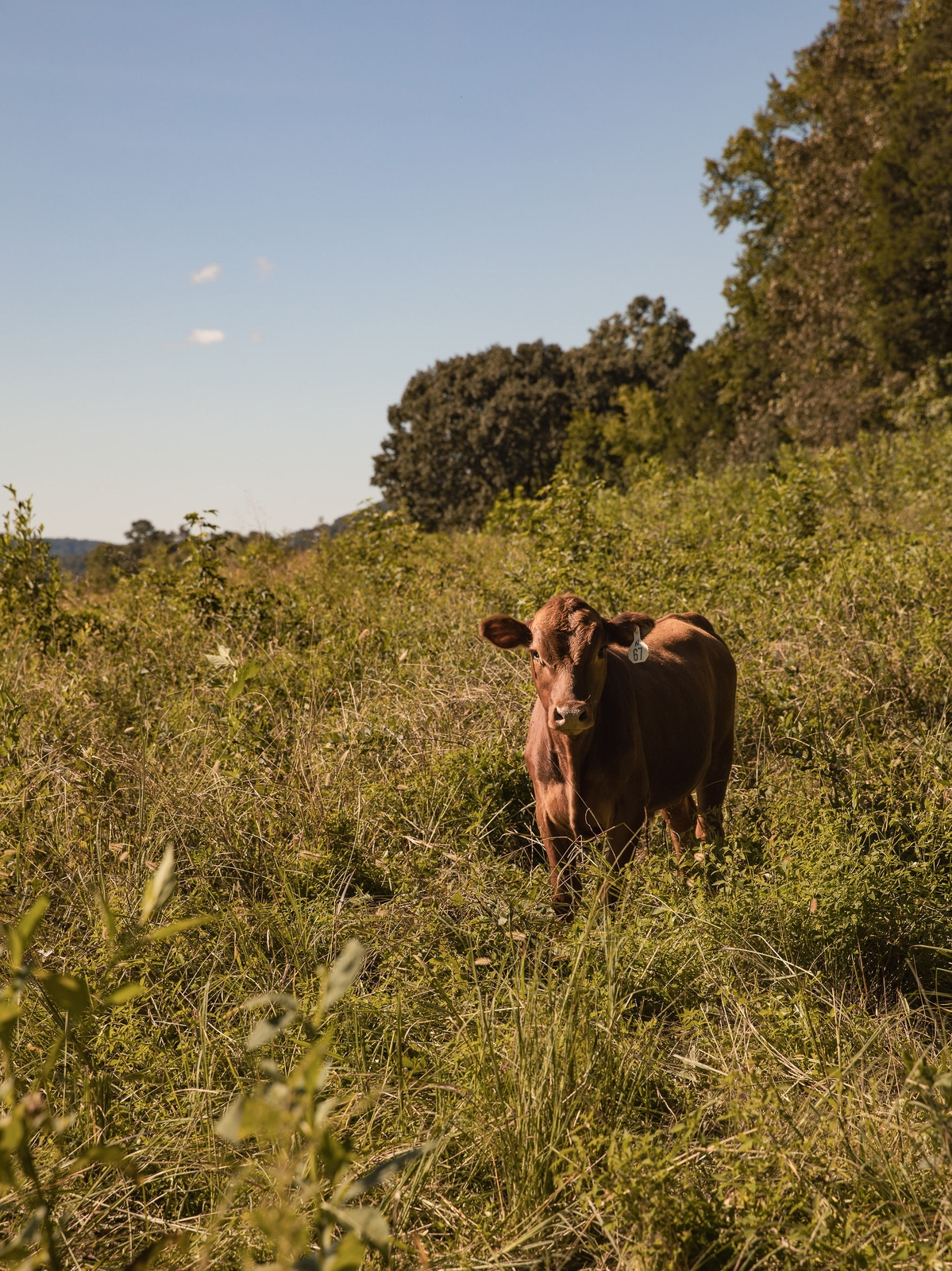
In 2009, he was helping load custom grazed yearlings into a cattle trailer for a buddy. The truck got stuck. Dave unhooked the tow chain right when the driver backed up.
"Pinned me between a flat-bed one-ton and the livestock trailer," he said. "My femur snapped.
"That was the start of me doing less."
River Ridge Farm is an exercise in potential. There is enough acreage to quadruple his herd, replant row crops, activate a greenhouse, host farm tours and workshops.
But one man can't shoulder this all alone.
It is the predicament of the aging, solitary farmer.
"Farmers are old and retiring," he said. "Someone young can come in and make a go of it. There is plenty of potential here, but I need the help."
There have been gains and losses.
In the mid '80s, his father, trying to escape debt, partnered with local leaders to build a 10-acre mini-industrial park on the farm near the river. The deal fell apart. Only the building remains.
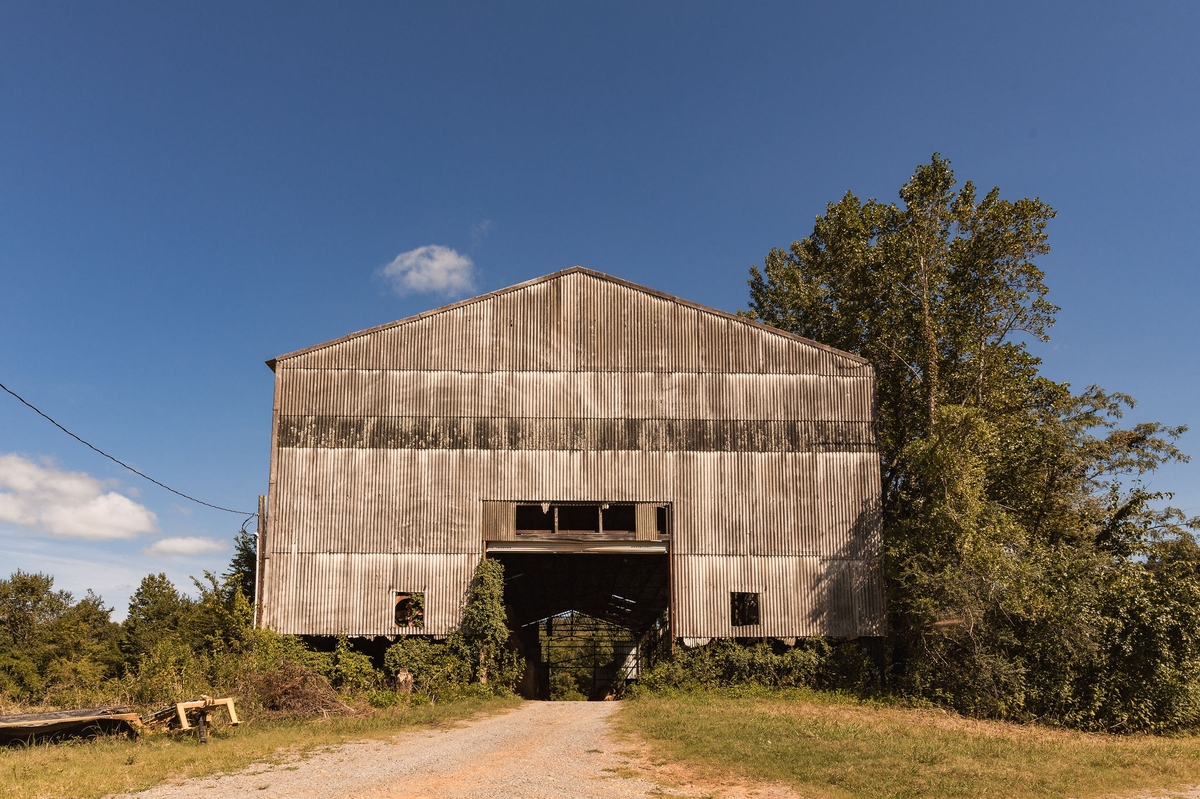
Today, it's used to store hay.
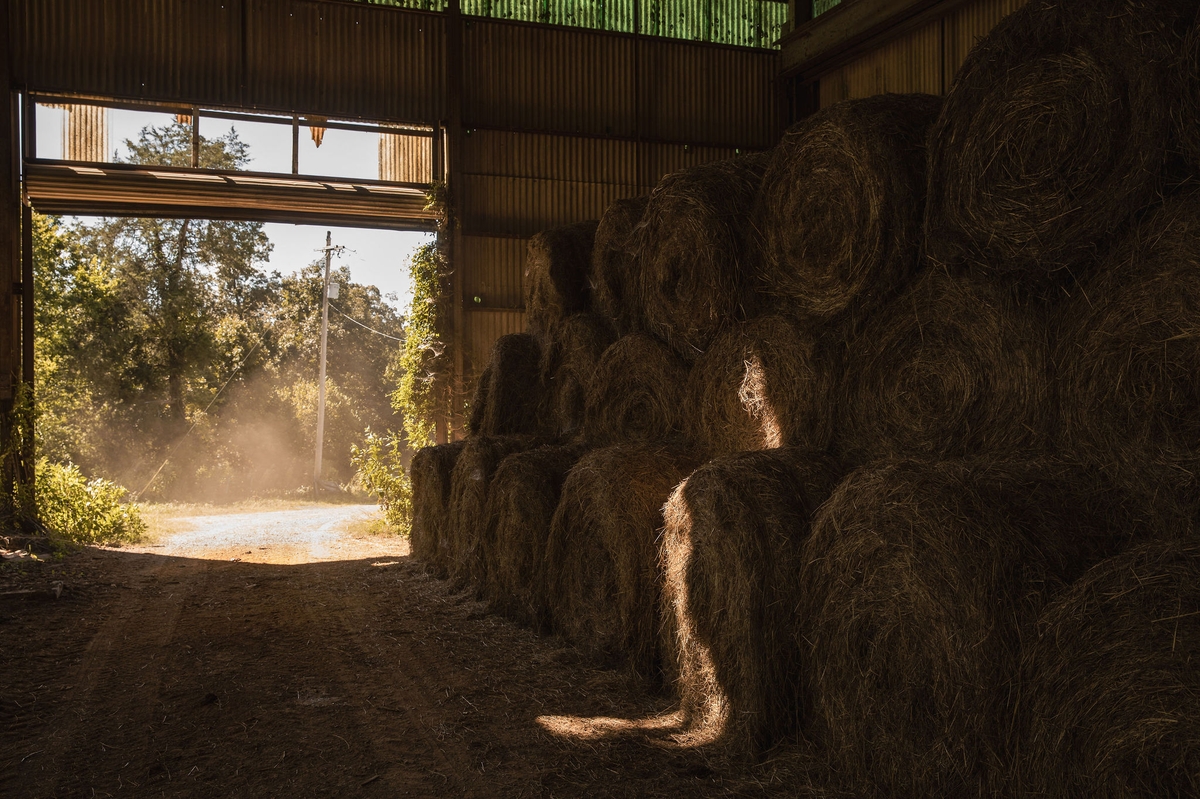
In 2019, Dave and Verlinda built a greenhouse for hemp growers to lease. It worked until it didn't: the hemp industry went broke.
Their land, of course, is worth millions. Instead of selling it, they placed 152 acres into a conservation easement with the Land Trust for Tennessee.
Dave envisions the return of SSAWG — the Southern Sustainable Agriculture Working Group — or some similar field day conference, where he and other restorative farmers can teach and mentor.
"I've got things good enough for people to start noticing," he said. "Not just for the cattle farmers, but for folks who grow row crops. They would be more profitable if they just reduced conventional inputs and added cover crops."
We visit the river, where he turns reflective, if just for a moment.
"They say deer will swim this river," he said, "but I've never seen them."
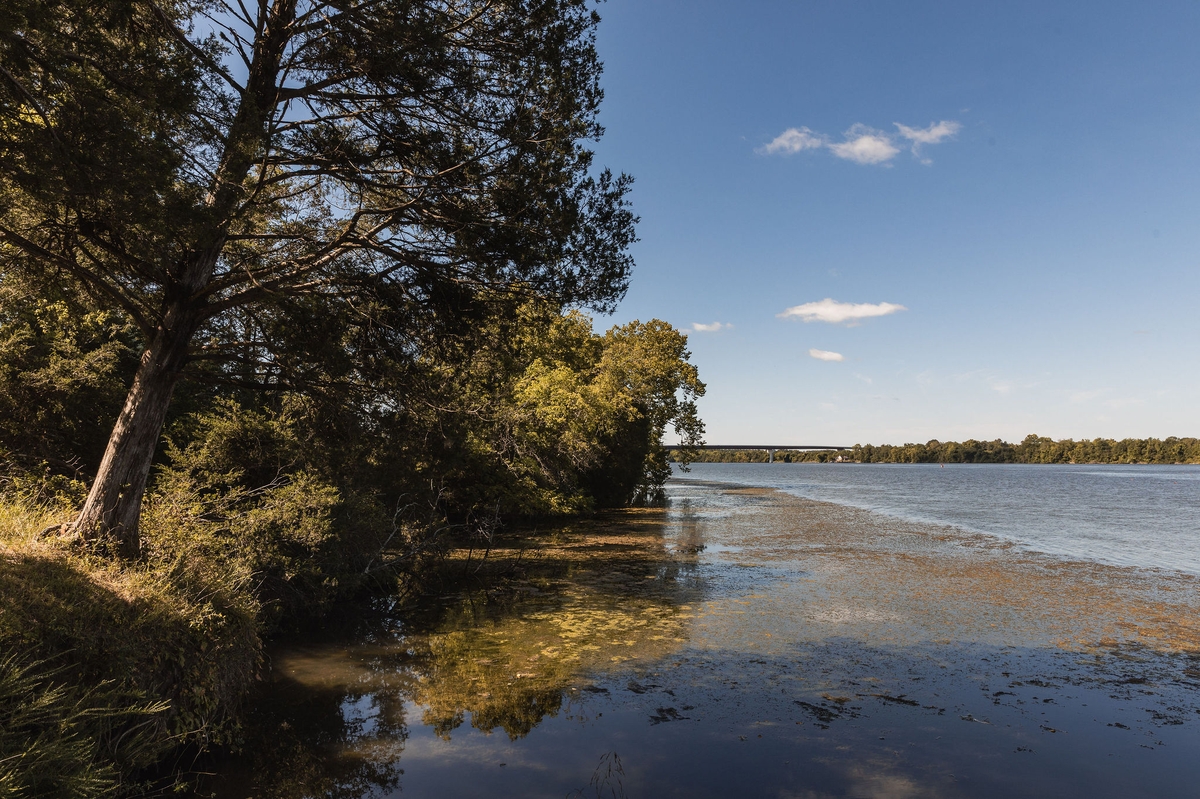
He praises the memory of his parents, who taught him how to work hard, and delights over his three granddaughters, each of whom could possibly run River Ridge Farm one day.
"That's my dream," he said. "They all love horses."
Two Aprils ago, he woke up at 4 in the morning with a start. Looked outside.
"Nothing but a glow," he said.
The barn was on fire.
"A chicken brooder. They knocked the heat lamp over. I'd been doing it that way for years," he said.
He steers the Kubota into another field. He's moving fence, and wishes he could move it even more frequently.
"Ideally, if I had time to move them two or three times today, I would give them probably about a fifth of what they've got so they can eat, rest a little bit and eat some more," he said.
He also bale grazes, a practice he learned from Dr. Allen Williams.
"I run poly wire where they can get to one bale at a time. It becomes a biological hotspot and gets the land rejuvenated," he said.
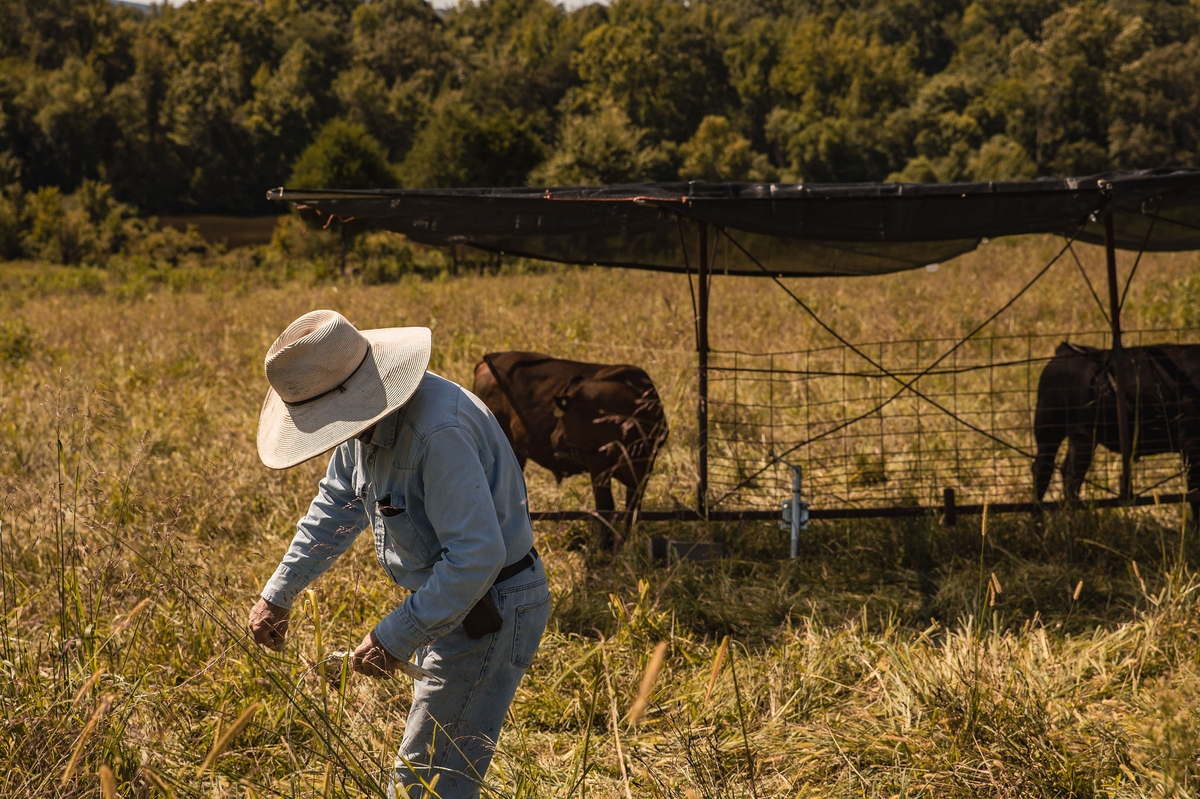
Watching Dave Waters move cattle in the late morning sun is like watching the seasons change: it feels orderly and good, that supportive ease that comes when the right person's in the right place at the right time.
This is the way to praise famous men:
To recognize the wholeness and goodness within their work, the quiet ways they contribute to the ongoing healing of the world.
"God put cows here to eat grass," he said. "That's what we need to be doing.
"Let them eat grass."
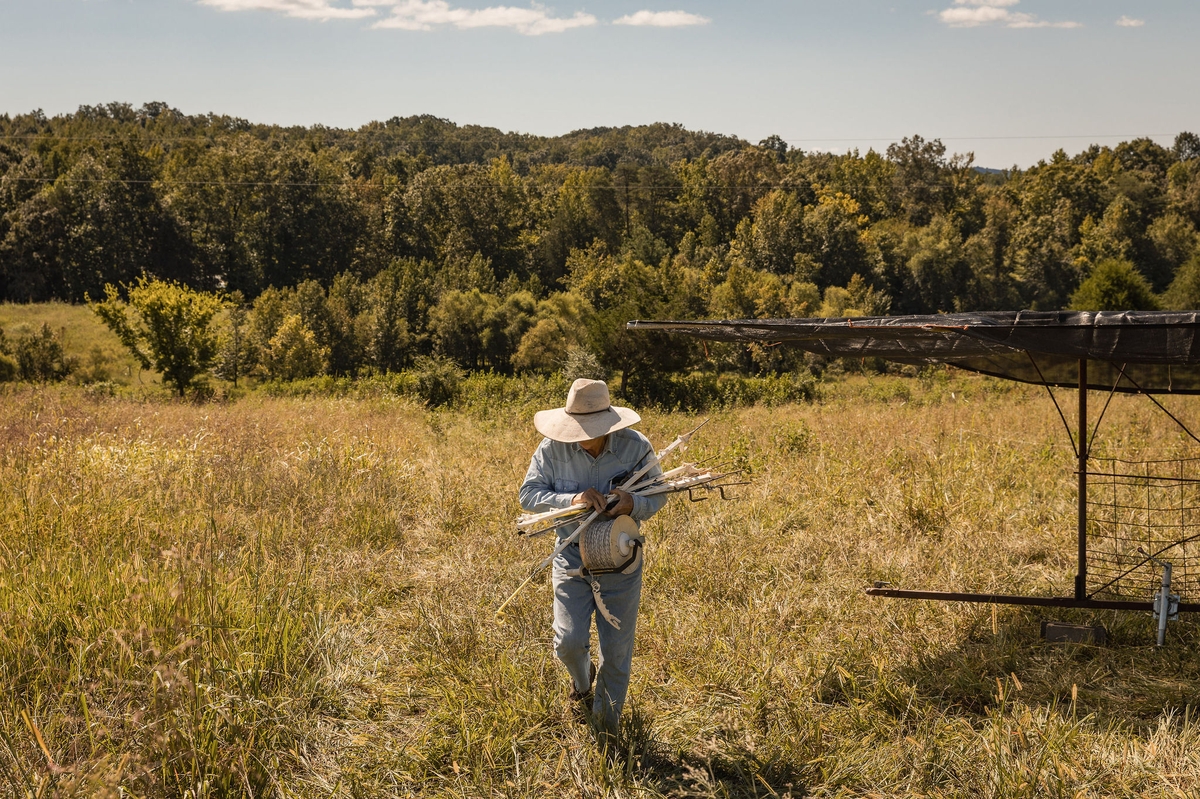
He rolls up the fence.
The cows immediately begin chew-walking into the new pasture.
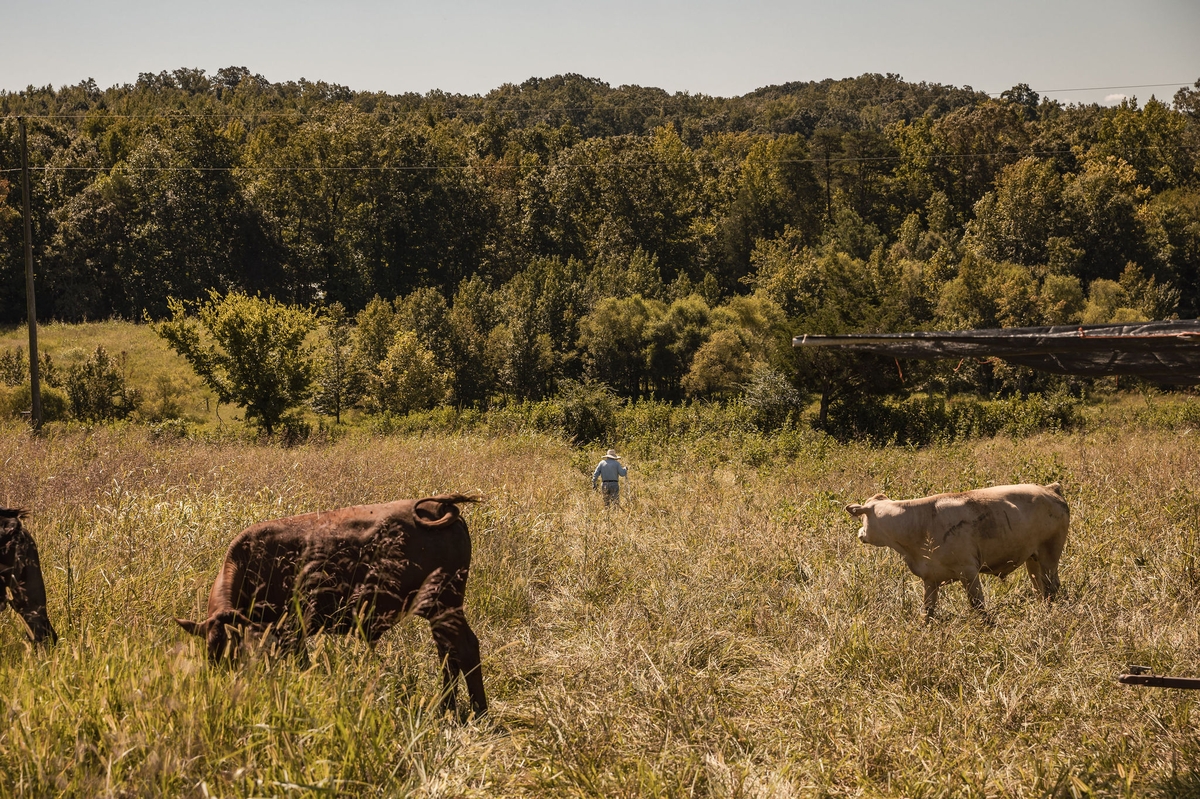
"God put cows on the earth to eat grass, not grain," he said. "So we need to be feeding them forage. They've got a rumen."
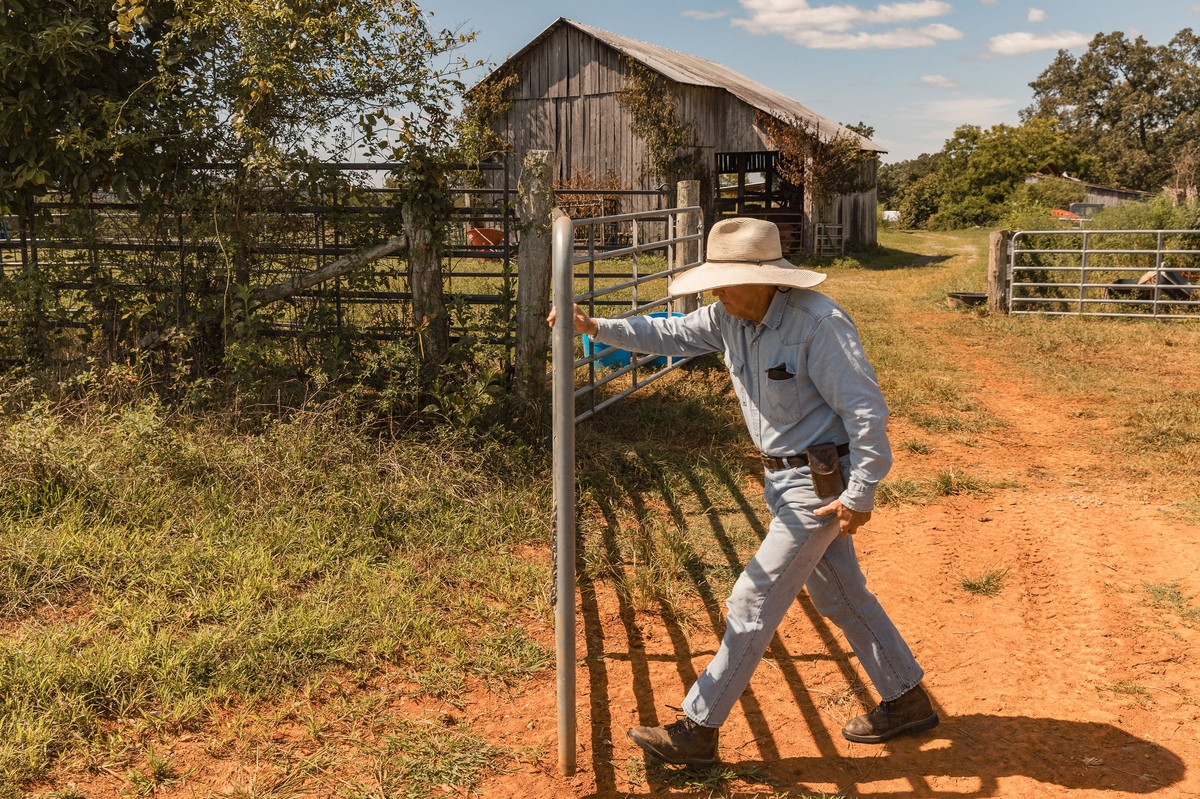
Dave has more work to do. He steers the Kubota back to the house, near the old home place where his mother was born and later died.
The river cane grows higher.
The birds swooping low over the fields.
The Waters helping it all.
We end in the same place we began.
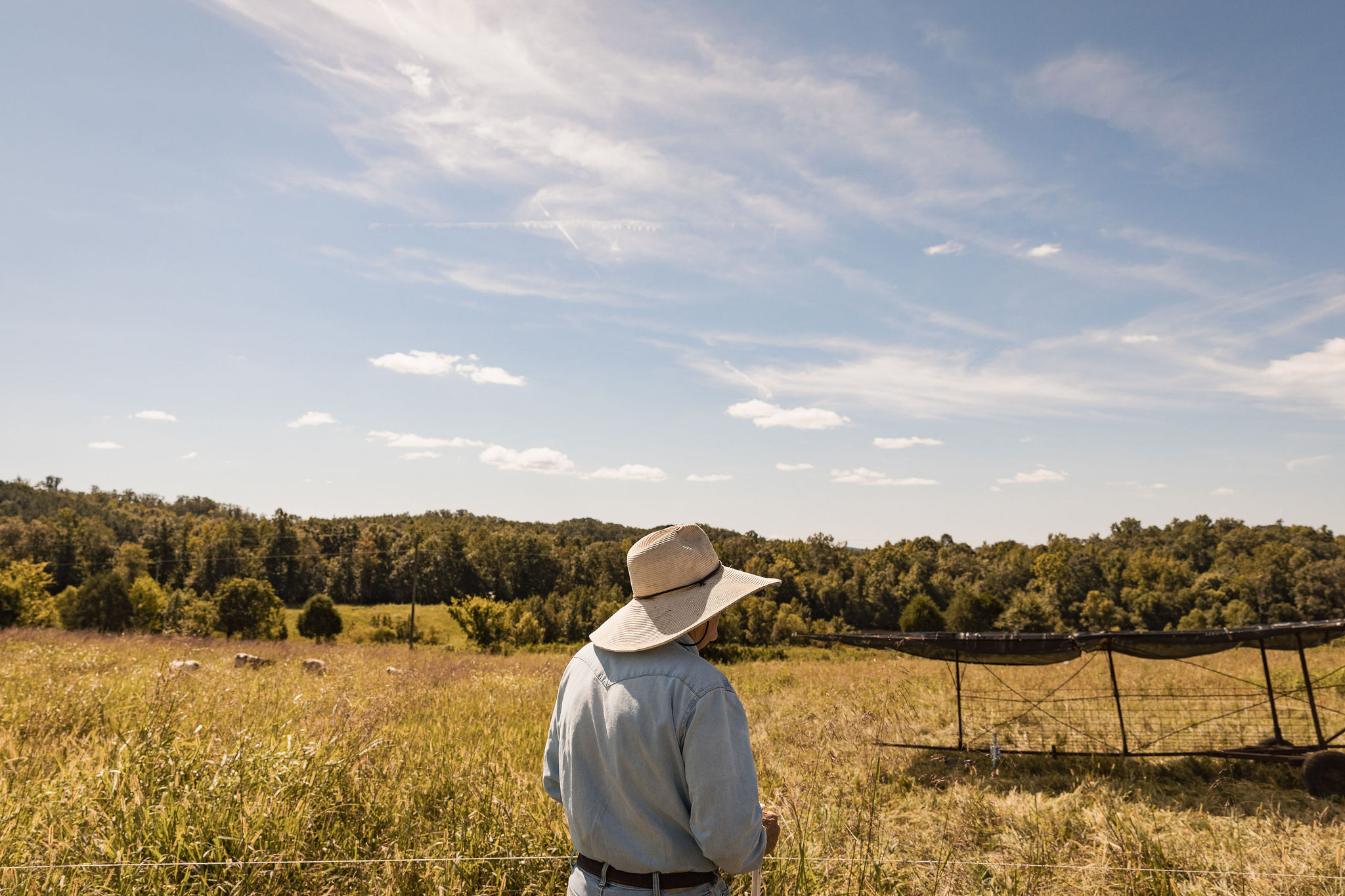
Story ideas, questions, feedback? Interested in partnering with us? Email: david@foodasaverb.com
This story is 100% human generated; no AI chatbot was used in the creation of this content.
"Where do you want to begin?" Dave Waters asks, standing under a bluebird August sky with 300 acres of Meigs County farmland behind him.
The green rolling land looks like a psalm. Behind him in the distance: the house he grew up in, the same house his mother was born and died in.
Also behind him? Decades of wisdom and experience.
In the ledger books recorded about regional agriculture, Dave Waters exists as an icon, a man well-versed in reinvention, transformation and resilience.
"Let us now praise famous men," the Hebrew canon declares.
In a time of increasingly technology, environmental stress and societal noise, can we listen to what men like Dave have to say?
His life, a lesson.

Dave and Verlinda Waters are early adopters of regenerative ag practices, eschewing conventional chemicals for fewer inputs. Helped start Chattanooga's first farmer-centric market. Placed their River Ridge Farm under a conservation easement with the Land Trust for Tennessee. When his father died of prostate cancer, so, too, did the use of chemicals on the land.
The river cane returned.
The birds returned.
The Waters returned.
"Getting rid of Roundup did a lot for the environment," he said.
The career Army officer and defense contractor was in the Pentagon on 9/11. At mid-life, he left Washington to return to Meigs County.
Six-and-a-half days a week, for since-always, Dave has done one thing: work and work hard.
"Three guys couldn't do what I do," he said. "I've got a mission? I'm going to do it."

But now?
"I turned 73 last week," he said. "Age is catching up to me."
So when he asks — where do you want to begin? — there's really only one answer.
Wherever you want, Mr. Waters.

He unfurls a topo map of the land across the hood of his Kubota.
"My great-grandfather purchased that land in 1873," he said.

"My dad passed in '93 and my mother gifted land to my older sister. Verlinda and I got 150 acres along the river," he said.
He continues, his story also unfurling like that map.
"Verlinda had colon cancer in 1998. We got a wake-up call on what we were eating and our health," he said.
Soon, they returned to Meigs County and began farming.

"My history? I graduated in 1970 from high school then went to Cleveland State.
"This was during Vietnam. My lottery number was 32. They wouldn't give me a student deferment. I went to UT and joined the Army ROTC and in December 1974, I went active duty.
"Verlinda and I married in 1972. For two redneck Tennessee hillbillies to move to Fort Ord — Monterrey Bay, California — was quite a culture shock," he said.
"I retired after 21 years and spent six more years in the Pentagon as a contractor."

On September 11, 2001, he was at his desk with the plane hit the Pentagon.
Within a year, he'd left the Pentagon, returned to Meigs County and began farming full-time.
"I was 50," he said, "a midlife crisis."
"I like hard work. My dad always said: 'you can't make enough farming so you have to have a second job,'" he said.
"He was right."
Dave stopped here, pausing, as if his prologue was over. There were cattle, river cane and farmland to see.
We climbed in the Kubota. Driving through his farm, Dave had his eyes on the past, present and future.
Looking ahead.
Looking behind.
There is the ground beneath all the stories.

Currently, Dave farms some 50 head of cattle, managing a herd of South Poll, Red Angus, British Whites, Angus. He's using a Red Angus-Mashona cross bull and breeding for heat tolerance and fly resistance.
"When we acquired the additional 150 acres, some of the fields were covered with blackberries as tall as your head," he said.
So, they got goats. At the height of their market days, they were producing grass-fed beef, pork, eggs, a milk-share and broilers. Dave drove to Bowling Green for processing.
Today, though, its solely cattle. Dave weaned a calf the week prior; we find them under a late morning shade tree, the calf separated from its mama by a few strands of wire.

Dave begins to talk about the economics of farming.
"The farm bureau, farm co-ops, livestock pharmaceuticals. That's where the profit is in agriculture," he said. "Input costs have skyrocketed, but commodity prices have not kept up. They've stayed the same.
"We rely too much on conventional chemicals and fertilizers and, now, technology," he said.
While still at the Pentagon, he began subscribing to the Stockman Grass Farmer. Attended a Virginia Tech workshop with Joel Salatin and Alan Nation, then visited Polyface Farms, where Salatin holds workshops.
He left with a notion: I need to do more of that.
"Current conventional thinking is turning towards technology as the way to improve profitability," he said. "Technology can help. There are times we need herbicides and fertilizers, but we do not need use it as much as we do."

Today, River Ridge Farm rotates its herds daily and sells halves and whole shares to clients in Chattanooga, Tellico Plains, Knoxville and Meigs County. Gone are his market days.
He talked about the head-shakingly high prices in the cattle world:
Some $3000 for a cow-calf pair. In Oklahoma, three weeks ago, a young Angus heifer with her first calf brought $3900 at the stockyard, he mentioned. A neighbor sold an 800-pound calf at a feeder sale and got $3.50 per pound.
So, what do you love about cattle farming?
"It's good eating and a wonderful tool to help bring your soil back to life," he said.

On September 11, 2001, he was at his desk in the Pentagon, working on force reduction analysis.
A colleague asked: did you hear about the Twin Towers?
"I assumed he was talking about a little Cessna," Dave said. "I had no idea until I felt the building shake."
Dust and waves of heat and debris. Fire alarms blaring.
"I locked the safe," he said. "And started evacuating."
The plane hit the area where, several weeks ago, Dave and his colleagues had been stationed. They'd moved from the area for renovation.
"I was already dreaming and planning. It was time to make the move. That was the last straw," he said.
By the fall of 2002, he and Verlinda had returned to Meigs County and began to farm full-time.
"I've started over many times," he said.

In 1998, Verlinda was diagnosed with colon cancer. (Today, she's cancer-free.) They learned to take more seriously their food — clean and whole versus processed — and the ground and practices from which it comes.
"What we ate was important," he said.
Sometimes, Dave Waters is a man of few words.
And often, Dave's few words are the only ones needed.
"We wanted to get the land in better shape," he said. "We need to take care of God's creation."

In 2009, he was helping load custom grazed yearlings into a cattle trailer for a buddy. The truck got stuck. Dave unhooked the tow chain right when the driver backed up.
"Pinned me between a flat-bed one-ton and the livestock trailer," he said. "My femur snapped.
"That was the start of me doing less."
River Ridge Farm is an exercise in potential. There is enough acreage to quadruple his herd, replant row crops, activate a greenhouse, host farm tours and workshops.
But one man can't shoulder this all alone.
It is the predicament of the aging, solitary farmer.
"Farmers are old and retiring," he said. "Someone young can come in and make a go of it. There is plenty of potential here, but I need the help."
There have been gains and losses.
In the mid '80s, his father, trying to escape debt, partnered with local leaders to build a 10-acre mini-industrial park on the farm near the river. The deal fell apart. Only the building remains.

Today, it's used to store hay.

In 2019, Dave and Verlinda built a greenhouse for hemp growers to lease. It worked until it didn't: the hemp industry went broke.
Their land, of course, is worth millions. Instead of selling it, they placed 152 acres into a conservation easement with the Land Trust for Tennessee.
Dave envisions the return of SSAWG — the Southern Sustainable Agriculture Working Group — or some similar field day conference, where he and other restorative farmers can teach and mentor.
"I've got things good enough for people to start noticing," he said. "Not just for the cattle farmers, but for folks who grow row crops. They would be more profitable if they just reduced conventional inputs and added cover crops."
We visit the river, where he turns reflective, if just for a moment.
"They say deer will swim this river," he said, "but I've never seen them."

He praises the memory of his parents, who taught him how to work hard, and delights over his three granddaughters, each of whom could possibly run River Ridge Farm one day.
"That's my dream," he said. "They all love horses."
Two Aprils ago, he woke up at 4 in the morning with a start. Looked outside.
"Nothing but a glow," he said.
The barn was on fire.
"A chicken brooder. They knocked the heat lamp over. I'd been doing it that way for years," he said.
He steers the Kubota into another field. He's moving fence, and wishes he could move it even more frequently.
"Ideally, if I had time to move them two or three times today, I would give them probably about a fifth of what they've got so they can eat, rest a little bit and eat some more," he said.
He also bale grazes, a practice he learned from Dr. Allen Williams.
"I run poly wire where they can get to one bale at a time. It becomes a biological hotspot and gets the land rejuvenated," he said.

Watching Dave Waters move cattle in the late morning sun is like watching the seasons change: it feels orderly and good, that supportive ease that comes when the right person's in the right place at the right time.
This is the way to praise famous men:
To recognize the wholeness and goodness within their work, the quiet ways they contribute to the ongoing healing of the world.
"God put cows here to eat grass," he said. "That's what we need to be doing.
"Let them eat grass."

He rolls up the fence.
The cows immediately begin chew-walking into the new pasture.

"God put cows on the earth to eat grass, not grain," he said. "So we need to be feeding them forage. They've got a rumen."

Dave has more work to do. He steers the Kubota back to the house, near the old home place where his mother was born and later died.
The river cane grows higher.
The birds swooping low over the fields.
The Waters helping it all.
We end in the same place we began.

Story ideas, questions, feedback? Interested in partnering with us? Email: david@foodasaverb.com
This story is 100% human generated; no AI chatbot was used in the creation of this content.


















